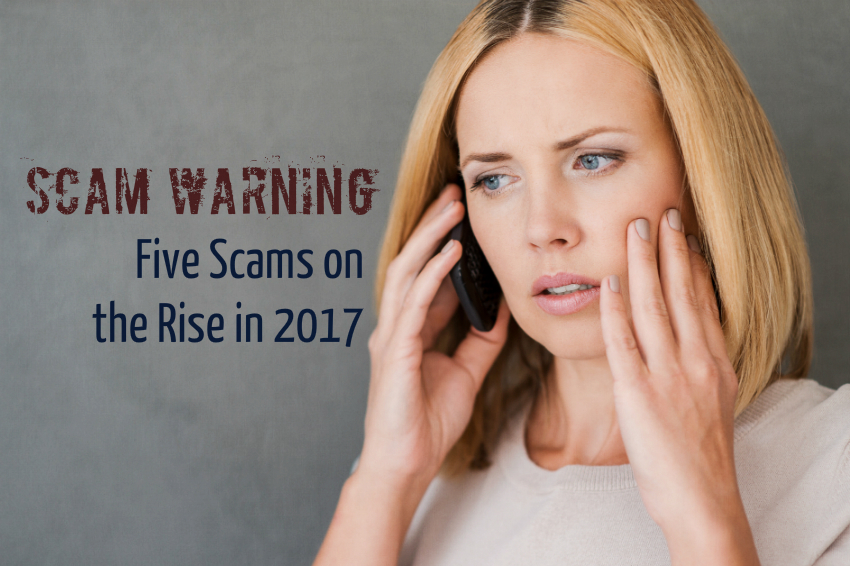Five popular new scams on the rise

It seems that as long as people exist, there will be scams. Methods change with time, but at their heart, scams will always be about preying on your fears. The most effective scams are the ones that successfully use your desire to help others and stay out of trouble against you.
Scams are like fads, in a way – they gain in popularity, overexpose themselves, lose steam, and eventually return in a new form. These are some of the most prevalent scams making the rounds today. Be on alert.
The “Can You Hear Me?” Scam
This particular scam started picking up steam late last year. It’s essentially a robocall (automated dialer) with a recording that asks something to the effect of, “Can you hear me?” The question itself may change, but it’s usually designed to elicit a “Yes” from whoever answers the phone. The scammer wants to get a recording of you saying “yes”, which they can then use to initiate calls with financial institutions and creditors, in the hopes of accessing your accounts.
Just hang up. If able, avoid calls from numbers you don’t recognize.
The FBI Calling Scam
This scam comes in many different shades and hues, but it basically amounts to a scammer calling from an official seeming number and demanding a payment.
Recently, there has been a rash of calls from scammers spoofing local FBI field office phone numbers. Based on what your caller ID is telling you, it looks like a legitimate call from the FBI. So when the person on the line starts demanding that you make an immediate money order payment on old student loans or unpaid parking tickets or else risk being arrested, you’d be forgiven for rushing to do as they say.
These kinds of calls can also come from places like the police or the IRS. Of course, the FBI, the IRS, and your local police department are not debt collectors. They will never call you and ask for a payment. So feel free to hang up.
As a general rule of thumb, never make a payment or give out sensitive information on a phone call you did not initiate. If you’re curious about the debt mentioned, follow up with your creditor directly. Just don’t use the phone number the caller provides – look up the phone number from a credible source.
Unsolicited Check Scams
Recently, consumers in multiple states have received checks in the mail, along with instructions. The instructions are for a “mystery shopper” program (most often at Walmart), and direct recipients to cash the checks, use the money to purchase a MoneyGram at a particular store, and then complete a survey on the experience.
Financial institutions can only hold funds for so long – unfortunately, not long enough to verify that the check is a fake. By then you’ll have sent a MoneyGram to the scammers and you’ll be on the hook with your bank or credit union in the amount of the bounced check.
Mystery shopper programs do exist, but they don’t typically hire strangers through the mail. There are a lot of variations on this scam, so make it a point to never, ever cash a check from a stranger, especially if that check comes on the condition that you “repay” some amount or wire funds to a third party.
Charity Scams
Scammers aren’t ones for ethics. Sadly, that extends to bilking money out of good citizens in the name of legitimate charities. Consumers in Indiana were recently victimized by a series of phone calls from scammers claiming to be soliciting donations on behalf of the Indiana Breast Cancer Awareness Trust. Some scammers even solicit donations face-to-face, pretending to represent a charity.
The safest way to support a charity is to contact them directly, either through their website or a publicly available phone number.
The Fake Kidnapping Scam
As noted above, scammers are all about preying on your emotions. In this extremely unpleasant scam, thieves will call and claim that someone you know (usually a child) has been kidnapped and demand that you make a payment immediately. Scammers gather real information by monitoring your online social accounts. They will demand that you act quickly and not contact the police.
This scam can take a few other forms, but the central idea is that someone you know is in trouble and you need to make a payment right away. The fact that they won’t let you off the phone without a payment is a telltale sign that this is a scam. Step back from the situation and check on the person in question if you’re concerned. Otherwise, just hang up.
Whenever you encounter a scam, don’t hesitate to report it. You can use the Better Business Bureau Scam Tracker to submit scams and the Federal Trade Commission’s Scam Alert page to monitor newly reported scams.

















